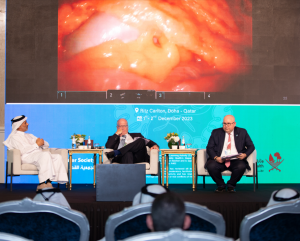The Gastrointestinal Cancers Congress begins with expectations of an increase in infection.
Under the Patronage of HE Sheikh Mohammed bin Abdulrahman bin Jassim Al Thani – Prime Minister and Minister of Foreign Affairs, HE Dr. Hanan Mohamed Al Kuwari, Minister of Public Health – launched the International Congress of Gastrointestinal Cancers 2023, organized by Qatar Cancer Society during December 1st – 2nd, 2023, at The Ritz-Carlton, Doha.

The Congress gathered more than 1,000 primary health care providers and a group of researchers. Academics and specialists in the field of gastrointestinal tumors worldwide, especially in America, Austria, Kuwait, Saudi Arabia, United Arab Emirates, Bahrain, Oman, Lebanon, and Jordan, In addition to the State of Qatar, represented by the Ministry of Public Health, Hamad Medical Corporation, and the Primary Health Care Corporation.
Over the two days, the Congress discussed all topics related to gastrointestinal cancers, risk factors, methods of diagnosis, treatment, and the latest international studies and research. It also discussed the most important reasons for the increased incidence of this type of cancer.
A global burden
His Excellency Sheikh Dr. Khalid bin Jabr Al Thani, Chairman of Qatar Cancer Society, said during his opening speech, “This Congress was held with expectations that incidence rates are to increase from roughly 18 per 100,000 to 34 per 100,000 by 2030, according to the Qatar National Cancer Registry – Ministry of Public Health in Qatar.

This Congress comes within the Qatar Cancer Society’s keenness to keep pace with global medical development. It makes Qatar a leader in cancer prevention and its burden control and provides all the necessary capabilities and support to control it locally. He added.
Recommendations
The International Congress came out with a set of recommendations, the most important of which are:
- Establish Multidisciplinary Teams: Encourage institutions to form multidisciplinary teams, combining the expertise of surgeons, oncologists, radiologists, pathologists, and nurse specialists for comprehensive GI cancer care.
- Enhance Surgical Training Programs: Develop advanced training programs for surgeons, focusing on the latest techniques in the surgical management of GI cancers, including colorectal, hepatic, and pancreatic cancers.
- Promote Precision Oncology Research: Advocate for increased funding and support for research in precision oncology to personalize colorectal cancer treatment, enhancing its efficacy and reducing side effects.
- Implement Liver Transplant Protocols: Recommend the adoption of specialized protocols for liver transplantation in metastatic colorectal cancer cases, ensuring optimal patient selection and post-operative care.
- Adopt Clinical Guidelines: Urge healthcare providers to adopt and integrate the Clinical Practice Guidelines into their treatment plans for metastatic colorectal cancer, ensuring evidence-based care.
- Organize Public Awareness Campaigns: Initiate public awareness campaigns on the importance of early detection and screening for GI cancers, focusing on risk factors and preventive strategies.
- Expand Access to Advanced Imaging: Facilitate more comprehensive access to advanced imaging technologies like CT-PET for accurate staging and monitoring of GI cancers, especially in under-resourced areas.
- Foster Economic Research in GI Cancer Treatment: Encourage studies on the cost-effectiveness of various GI cancer treatment modalities to inform policy decisions and healthcare spending.
- Enhance Patient Support Services: Establish comprehensive patient support services, including nutritional counseling, psychological support, and pain management, to improve the quality of life for patients with GI cancers.
- Create Specialized Cancer Units: Advocate for developing specialized cancer units like the Oesophago-Gastric Cancer Unit in Qatar, focusing on targeted treatment and research in specific types of GI cancers.


